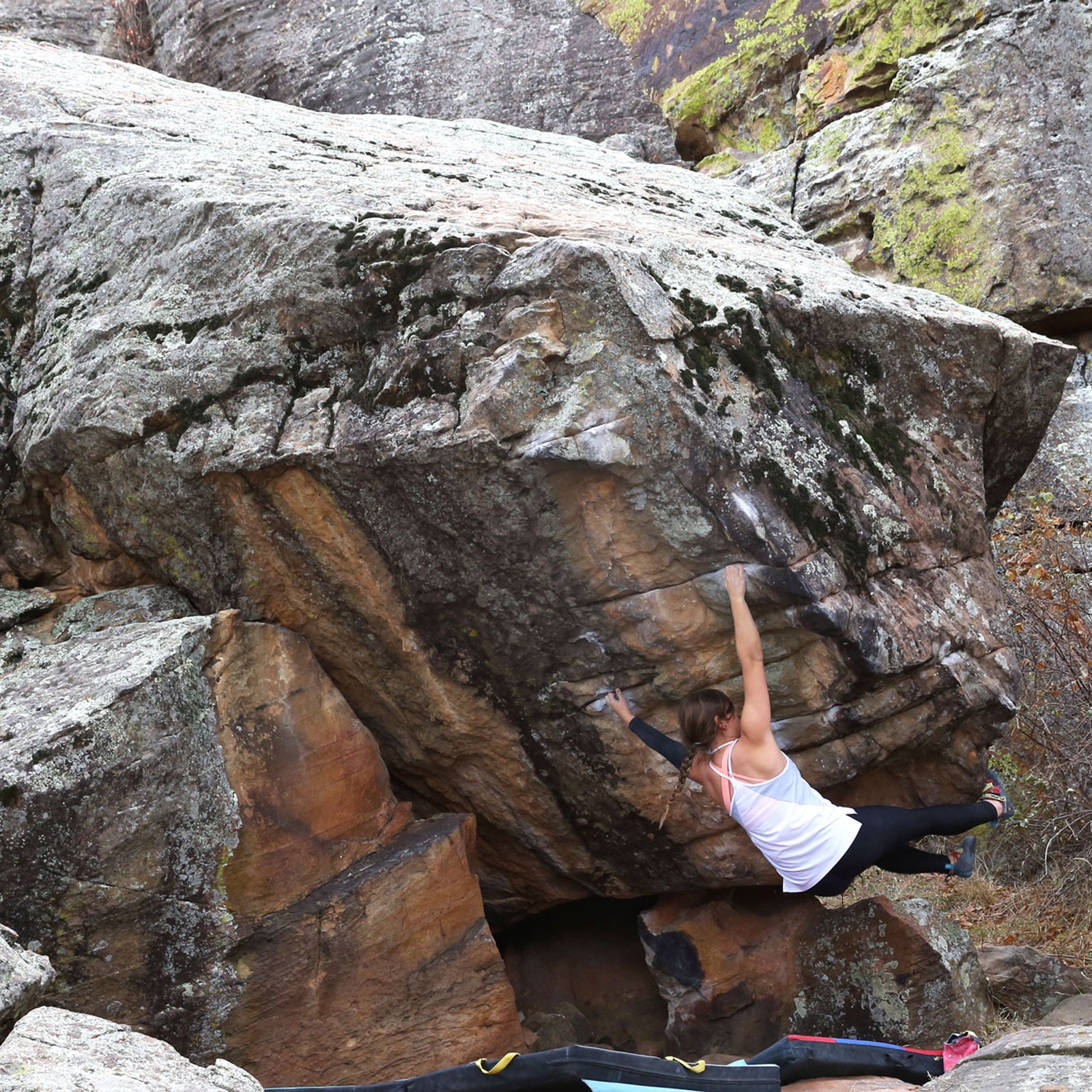It was March 2018, and IÔÇÖd just moved to New Mexico from the frigid climes of Minnesota. I relocated for a job at ║┌┴¤│ď╣¤═°, my long-term relationship had just ended, and I was searching for something to tell me that I hadnÔÇÖt just ripped my life up by the roots for nothing. So when a new colleague asked me to go bouldering one weekend, I was stoked. I had been climbing indoors for years, but this was an opportunity to test my outdoor skills and learn about my new home.
We drove out early one Saturday morning. Roy╠řis a 2.5-hour drive northeast╠řof╠řSanta Fe, and the farther we got from town, the louder the whispers of doubt became in my mind. Signs of civilization were quickly replaced by swaths of dried-up grassland dotted with free-range cattle. I started to seriously question the verity of my new friendÔÇÖs testament to world-class bouldering in New Mexico. Sure, ╠řRoy, declaring it ÔÇťAmericaÔÇÖs Next Great Bouldering Destination,ÔÇŁ but was it really all the author had made it out to be? We turned off Interstate 25 and into a little village called , population╠ř291. There wasnÔÇÖt muchÔÇösmall houses, two gas stations, and a public school. Thirty-four miles down a two-lane road later, we arrived in╠řRoy.
Roy is even smaller than Wagon Mound, with 234 residents nestled in homes down the back alleys off a run-down main street. An iconic orange-and-white-striped water tower looms over the primary drag, which is scattered with small semi-abandoned shops and hotels. At first╠řitÔÇÖs easy to feel that this farming town peaked 40 years ago. But beyond the main street, thereÔÇÖs a whole new community unfolding in╠řRoy, one drawn to the areaÔÇÖs dozens of canyons packed with top-notch╠řbouldering routes.
The sheer volume and density of high-quality climbs in Roy make╠řit different╠řfrom╠řanywhere else IÔÇÖve been in the United States. Unlike big climbing destinations, like Red Rock near Las Vegas, RoyÔÇÖs remoteness adds a sense of raw adventure that reminds me of running around in the woods as a kidÔÇölike somehow youÔÇÖre the only one in on this magical secret. Giant, high-ball boulders are piled up at the bottom of streambeds, just asking to be cleaned and ascended. A 30-mile╠řcliff band borders the canyons, with╠řover 1,800 documented routes ready and waiting inside their walls. After that first trip in 2018,╠řI would spend every weekend the following season exploring the areaÔÇÖs endless trails with a new group of friends.
Although smaller groups explored Roy in the 1990s,╠řthe area╠řwas largely uncovered in 2003 by archaeologist and climber William Penner, who was conducting a survey for the U.S. Forest Service. He, along with fellow early developer Tom Ellis, kept their secret mostly under wraps for the next decade, occasionally taking out small groups of friends. In 2011, word broke╠řwhen a╠řphoto of╠řRoy╠řcirculated online among the Colorado climbing community.╠řIn that same year,╠řpro climber╠řJason Kehl╠řmade a trip╠řto the area, and Paul Robinson followed in 2013. Traffic from both local and out-of-state climbers has steadily increased ever since, bringing a slew of environmental╠řissues. ÔÇťFor somewhere so remote and quiet, it was a sudden change of gears,ÔÇŁ says Owen Summerscales,╠řauthor of the New Mexico Bouldering guidebook. According to a recent Santa Fe╠řNew Mexican , 80 percent of the stateÔÇÖs thousands of╠řbouldering routes were undocumented before the book was published in 2016, and that╠řguide╠řwas the first to include Roy, giving╠řclimbers a window into a treasured area previously passed on via word of mouth, while attempting to educate new visitors on how vulnerable it is.
Roy is more susceptible to impact than other major climbing destinations, due to a lack of developed trails or roads, waste management, and restroom amenities.╠řCurrently, there are only two established╠řcampgrounds:╠řMills Canyon, which is difficult to reach and far away from climbing areas, and Mills Canyon Rim, a site that has two pit toilets and six official campsites. The sudden influx of climbers caught townies and Forest Service land managers╠řoff guard, not because they didnÔÇÖt want people coming to Roy, but because they, like me, didnÔÇÖt trust the clamors of world-class climbing in the otherwise barren landscape. ÔÇťWith the advent of social media, the release of the guidebook, and other publications talking about it, itÔÇÖs been like the mining boom,ÔÇŁ says Michael Atkinson, a district ranger for the Forest Service who covers Cibola National Forest and the Kiowa and Rita Blanca National Grasslands, where Roy is located. ÔÇťAs soon as people heard there was gold, everyone with a shovel went out there.ÔÇŁ
The guidebook has since sold out, and Summerscales has no immediate plans to print more. , Summerscales╠řwrote, ÔÇťI am very aware that the book brought Roy in particular to the masses, and some weight is on my shoulders. I do not want to publish any more updates for Roy climbing until we can be sure that there is the infrastructure to cope with the crowds that another guidebook update would bring.ÔÇŁ
This season╠řis arguably the most important one for Roy yet. With its inclusion in this yearÔÇÖs╠ř╠řdocumentary film The High Road, which debuted in October, thereÔÇÖs more interest in the area╠řthan ever before. As someone who cares about Roy╠řbut also plans to continue climbing there, IÔÇÖve learned to treat it like my home crag. A lot of impact╠řcan be mitigated when╠řvisitors follow╠řall Leave No Trace , including cleaning any tick marks before leaving a climb, packing out all trash and human waste, keeping noise pollution to a minimum, and respecting the locals. ÔÇťWeÔÇÖre here, and we visit the canyon because we have an attachment and a love for it,ÔÇŁ Atkinson says. ÔÇťWe feel that we share that with all recreational users. Like anyone who visits something you love, we hope they will respect it.ÔÇŁ
Area developers say that less than 15 percent of the climbing in Roy has been documented in the guidebook, and new routes are being developed every season. Anyone who climbs here╠řunderstands the magnitude of the resource. ÔÇť[Roy] isnÔÇÖt going anywhere, itÔÇÖs just getting better and better,ÔÇŁ Summerscales says. ÔÇťThere really is no question about it being one of the best bouldering areas in the United States.ÔÇŁ
Know Before You Go
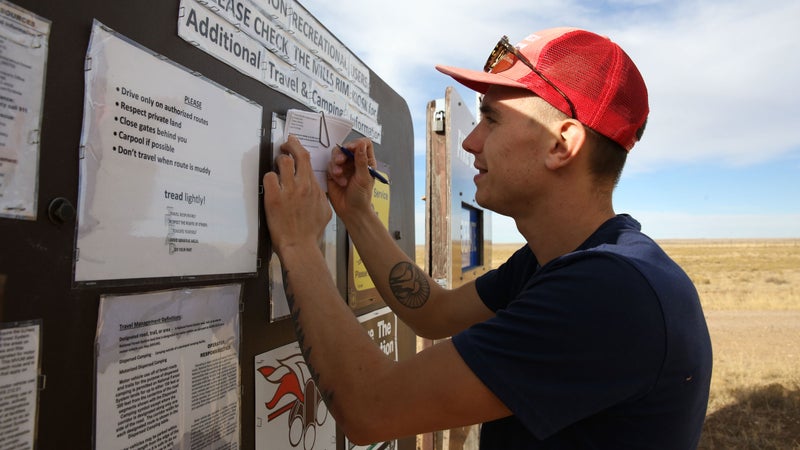
Respect local ranchers and hunters. Be sure to close all gates you pass through, and not to disturb any cattle you encounter. This area is popular for hunting turkey and pronghorn, but you shouldnÔÇÖt run into many hunters, as they usually venture closer to the Canadian River, west of╠řthe climbing areas.
Prepare to be completely self-sufficient. Pack in all water and food, and pack out your waste. Chances are╠řyou wonÔÇÖt have cell service, so let people know where youÔÇÖre going and when youÔÇÖll be back.
Download the Vertical-Life app. Since the guidebook to the area is no longer available for purchase and the trails and routes are unmarked, the closest you will get to successfully navigating the area is by using the ╠ř($5 per month), which offers beta on route locations and grades.╠řItÔÇÖs best to create a plan before heading out for the day, since the climbing areas are spread out.
Use a high-clearance╠řfour-wheel-drive vehicle. Most of the roads are rough and rocky. If the ones leading to the trails are wet, park at Mills Canyon Rim Campground and hike to the First Streambed area instead. Driving on these roads after rainfall will deteriorate╠řtheir conditions and make it harder for people to travel after you.
Treat Roy like a backcountry experience. ÔÇťIn Harding County, where Roy is located, emergency-response teams╠řare manned by volunteers. An hour-plus response time isnÔÇÖt╠řout of the ordinary,ÔÇŁ Atkinson says. ÔÇťInjuries should be thought of in the same respect as people who go out in the wilderness.ÔÇŁ
When to Visit
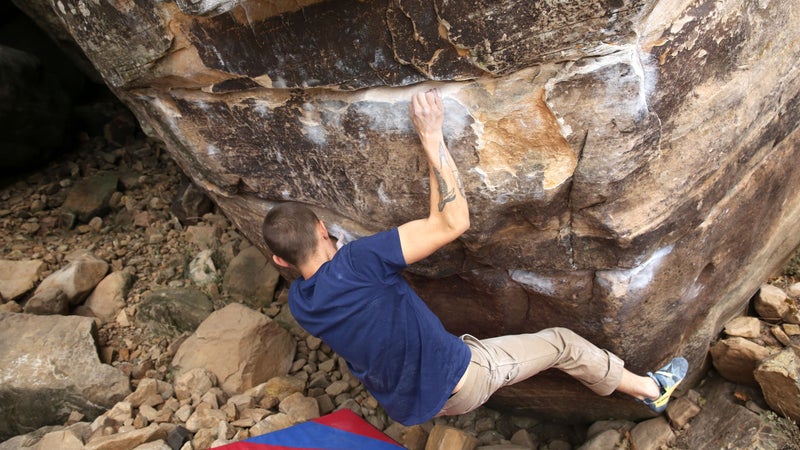
The prime season to visit Roy is winter.╠řSummer is too hot to navigate the canyons safely, not to mention theyÔÇÖre rife with rattlesnakes. Spring and fall weather can be unpredictable, so itÔÇÖs hard to gauge conditions if youÔÇÖre coming from out of state. Peak season runs from November to March or April. But to avoid crowds, head there early, at the start of October, when temperatures become more moderate and the risk of rattlesnake encounters decreases. Average conditions vary year to year, but you can expect winter highs around 50 degrees and lows of 20 degrees.
Make sure to check the weather forecast before you go. For the colder winter months, youÔÇÖll need╠řappropriate╠řgear to sleep comfortably throughout the night. And be sure to pack plenty of layers so youÔÇÖll be warm in the morning╠řand cool╠řin the afternoon once the canyons heat up.
How to Get There
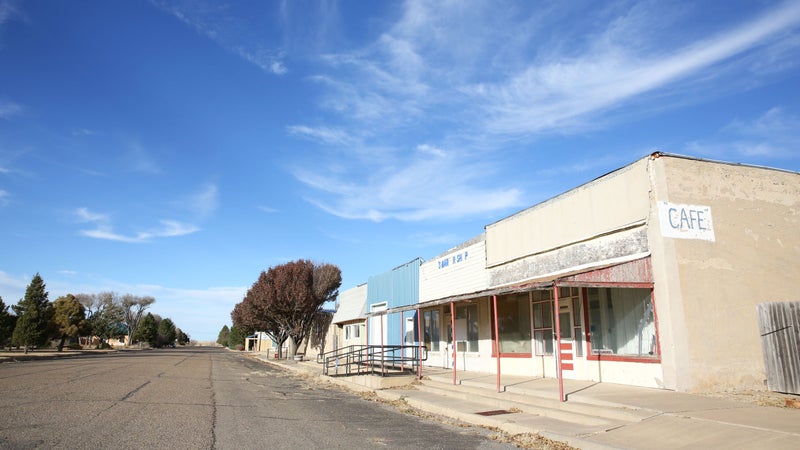
Santa Fe is the closest airport, but it has limited regional flights. If youÔÇÖre traveling from out of state, the easiest thing to do is fly into╠řAlbuquerque International Sunport and drive north on I-25 for three and a half hours until you reach the Wagon Mound exit. Alternatively, from╠řDenver, travel south on I-25 for about five hours and exit at Springer.
From the village of Roy, head north on New Mexico Highway 39 for about ten miles until you reach a sign for Mills Canyon Rim╠řCampground. Take a left at the sign onto a gravel road, and continue for five miles until you see a sign for Kiowa National Grasslands and a wooden Smokey╠řBear, where you can fill out the survey provided by the Forest Service so it╠řcan plan╠řfuture infrastructure needs. From Mills Canyon Rim Campground, you can hike directly to some climbing areas and navigate to others using the Vertical-Life app or guidebook.
Where to Stay
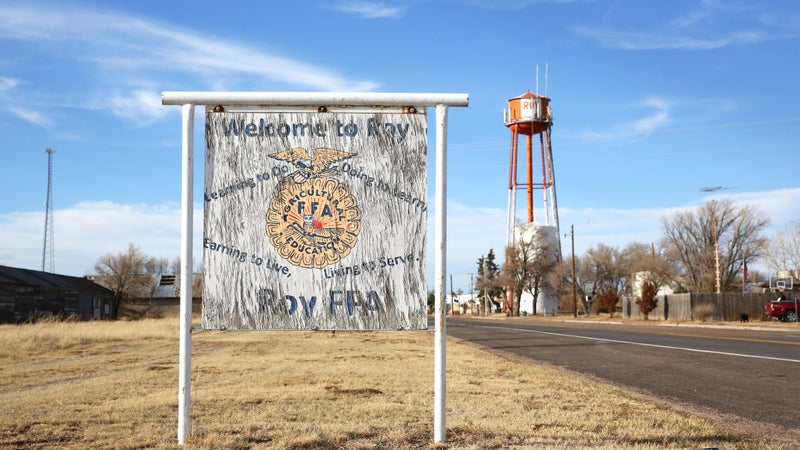
Most people camp when they visit Roy. Crowds tend to be centered at . The six sites are available on a first-come, first-served basis, so it will be in your best interest to get there before the Saturday hoarde╠řhits. There are two pit toilets╠řbut no running water, so bring╠řin enough for your stay.
ThereÔÇÖs also dispersed camping at some trailheads, like the popular Jumbles climbing area. Be respectful when staying in these spots, as thereÔÇÖs been increased impact from use in recent years. Pack in your water, and carry out╠řout all of your waste, food, and trash.
Due to RoyÔÇÖs remote nature, other options are extremely limited. ThereÔÇÖs the six-person in Roy (from $70), which could be a good choice for those exceptionally cold nights. The town of Springer, located 45 miles north, also has a few motels.
Where to Climb
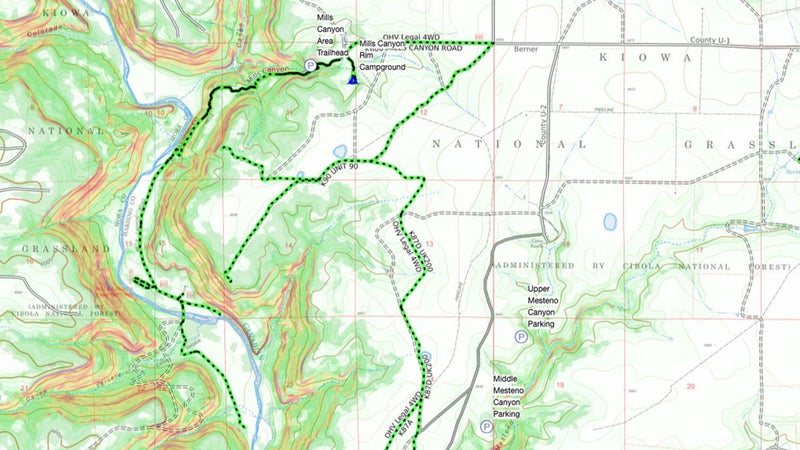
The documented climbing in Roy is split into three partsÔÇöMiddle Meste├▒o Canyon, Upper Meste├▒o Canyon, and Mills Canyon. You could visit a different area every day of the season and still not have touched most of the routes. As shown on the map above, most roads and trails to these climbing areas split off from Mills Canyon Rim Campground, which serves as a perfect base camp. But itÔÇÖs worth noting that even with the guidebook or app, trails can be difficult to locate, so budget extra time on your first trip to search for climbs.
Middle Meste├▒o Canyon
The canyonÔÇÖs Jumbles area is a good place to start, as it features the most concentrated╠řhigh-quality climbs (and the crowds to match), making it easier for first-timers to get a lay of the land. From the campground, the trailhead is about a 4.5-mile drive southeast and is easy to access with a four-wheel-drive vehicle. Middle Meste├▒o has one of the shortest approaches, at about 15 minutes, but can be steep in some parts.
Long Ass (V1) is a great warm-up, with sweeping views of the canyon at the top. Classic routes include Fun Bags (V6) and Instagram-worthy Triangular (V6), which takes you up a long ar├¬te╠řand tops out at a sketchy point that would make anyone queasy. More advanced climbers will find solace in climbs like Icarus (V7) or RoyGBiv (V10).
Upper Meste├▒o Canyon
This area is a longer, 30-minute hike from the trailhead, but youÔÇÖll find a full day of routes worth exploring. From the campground, the trailhead is about four miles southeast, just above Middle Meste├▒o. Check out favorites like Ergonomicon (V7) and Sundial (V11), which Nina Williams first ascended╠řin The High Road.╠řIf your╠řstyle is long, overhanging roofs, pay a visit to Mega Roof, which has several climbs at different levels. Dust Bowl (V7) will test your core strength and stamina, with over 30 moves in a row.
Mills Canyon
If you only have a few hours, thereÔÇÖs a lot to be tackled in Mills Canyon that doesnÔÇÖt require the use of a four-wheel-drive vehicle. An easy-to-moderate 20-minute hike from Mills Canyon Rim Campground leads to the First Streambed area, where there are a full range of climbs. Personal favorites include the warm-up Cuban Boulder (V1ÔÇôV3), Pumped Full of Roy (V5), and Nobody (V10). More advanced climbers looking for a project will love the challenge of Calm Ethereal (V13), a beautiful line that has a unique, dynamic move up to a side-pull crack.
Detour
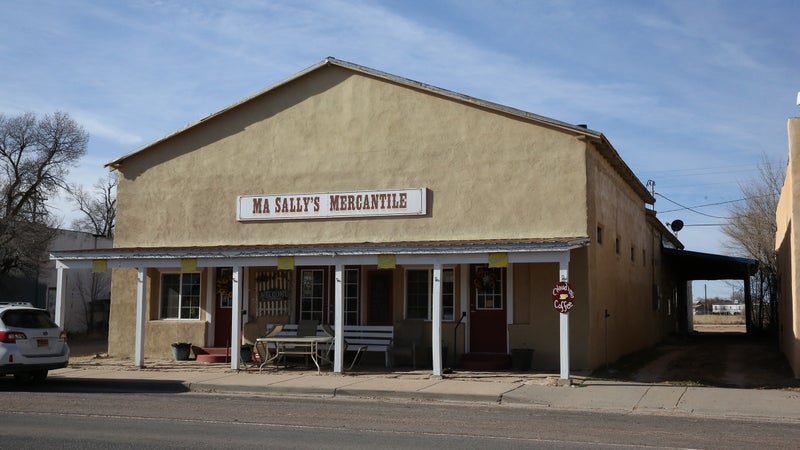
DonÔÇÖt speed through the town of Roy without stopping at , a small shop on the main drag╠řthat mostly sells western and country furniture╠řbut also stocks climbing chalk and tape. ThereÔÇÖs the , which supplies╠řsnacks and can save you when you forget coffee in the morning. And if youÔÇÖre looking for a place to sit down and experience the local community, ╠řis a great diner with burgers, New Mexican food, and ice cream. Note that with the exception of LonitaÔÇÖs, these places, along with most businesses in Roy, are closed on Sundays.


